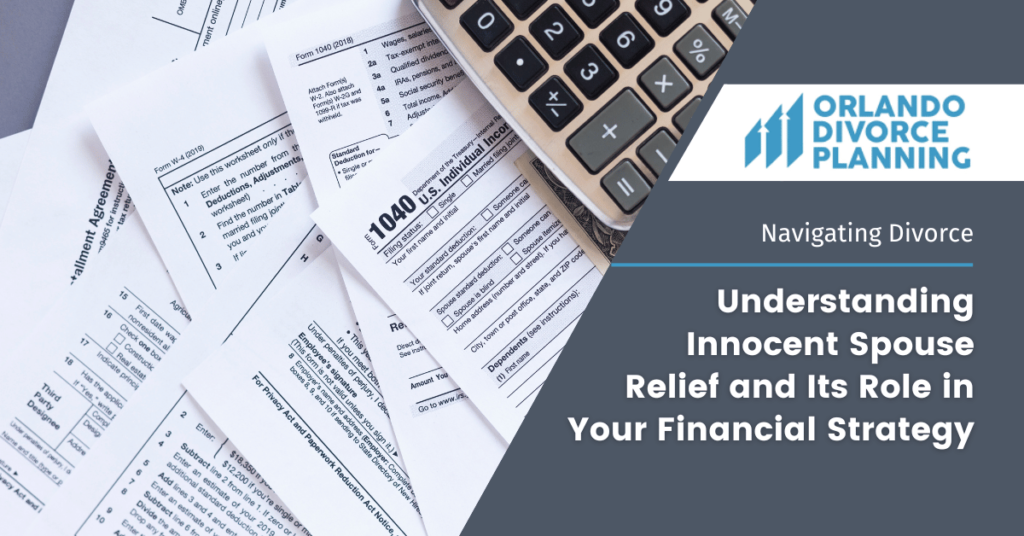Navigating Divorce
Divorce is a complex and emotional process, often entangled with financial challenges that can add stress to an already difficult time. One area that can significantly impact your financial well-being during and after a divorce is the issue of tax liabilities. If you face tax debt due to your spouse’s actions, you might feel overwhelmed and uncertain about your options. This is where Innocent Spouse Relief can play a crucial role in your financial strategy.
What is Innocent Spouse Relief?
Innocent Spouse Relief is a provision by the IRS that can relieve you from paying taxes, interest, and penalties if your spouse or former spouse improperly reported items or omitted items on your joint tax return. This relief is designed to protect individuals unaware of the inaccuracies in their tax filings and would face financial hardship if held responsible for the tax debt.
Eligibility for Innocent Spouse Relief
To qualify for Innocent Spouse Relief, you must meet the following criteria:
1. Filing Status: You must have filed a joint return with an understatement of tax due to erroneous items of your spouse (or former spouse).
2. No Knowledge: You must prove that at the time you signed the joint return, you did not know and had no reason to know about the erroneous items causing the understatement.
3. Inequitable to Hold You Liable: It must be unfair to hold you liable for the understatement of tax, considering all the facts and circumstances.
Types of Innocent Spouse Relief
There are three types of relief available:
1. Innocent Spouse Relief: Provides relief from additional tax you owe if your spouse (or former spouse) failed to report income, reported income improperly, or claimed improper deductions or credits.
2. Relief by Separation of Liability: Allocates the understated tax (plus interest and penalties) between you and your spouse (or former spouse) if you are no longer married, legally separated, or not living together.
3. Equitable Relief: If you do not qualify for the other two types of relief, you may still be relieved of responsibility for tax, interest, and penalties through equitable relief.
How Innocent Spouse Relief Can Be Part of Your Divorce Strategy
Understanding and utilizing Innocent Spouse Relief can be a vital part of your financial strategy during a divorce. Here’s how:
1. Assess Tax Liabilities: Work with your divorce financial advisor to assess any potential tax liabilities arising from your joint returns. Identifying these early can help in negotiating settlements and support arrangements.
2. Documentation and Evidence: Collect all necessary documentation to support your claim for Innocent Spouse Relief. This may include financial records, communications with your spouse, and any evidence showing your lack of knowledge about the erroneous tax filings.
3. Professional Guidance: Engage a Certified Divorce Financial Analyst (CDFA) and a tax professional to navigate the complexities of the relief application. Their expertise can ensure that you meet all requirements and present a strong case to the IRS.
4. Settlement Negotiations: Leverage your potential eligibility for Innocent Spouse Relief during settlement negotiations. This can influence the division of assets and debts, ensuring a fair outcome.
5. Financial Planning: Integrate the implications of Innocent Spouse Relief into your post-divorce financial plan. Understanding your potential tax obligations or relief can help you make informed decisions about budgeting, investments, and future financial goals.
Take Action Today
Divorce is a challenging time, but you don’t have to navigate it alone. At Orlando Divorce Planning, we specialize in helping individuals like you understand and utilize financial strategies to achieve the best possible outcomes. If you think you might qualify for Innocent Spouse Relief or need expert advice on managing your finances through divorce, reach out to us today. Our team of Certified Divorce Financial Analysts are here to guide you every step of the way.
Contact Orlando Divorce Planning now to schedule your consultation and take control of your financial future.



